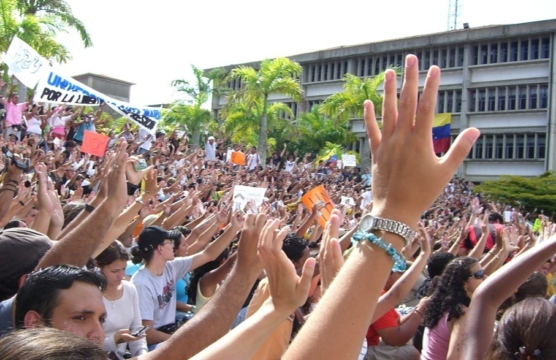
Chinese News Coverage of Latin America
Chinese media coverage of Latin America in February focused primarily on opposition protests in Venezuela.
WASHINGTON, D.C.—El Salvador’s democratic institutions appear especially fragile after President Nayib Bukele’s Nuevas Ideas party emerged victorious from the Feb. 28 legislative elections, U.S. Rep. Jim McGovern (D-Mass.) said during an event hosted by the Inter-American Dialogue in partnership with the Due Process of Law Foundation, or DPLF, Cristosal and the Washington Office on Latin America.
“Democracy and rule of law are at a crossroads in El Salvador,” McGovern said, adding that Bukele’s recent behavior demonstrates “a disturbing trend toward authoritarian rule rather than a strengthening of democracy.”
Panelists at the event agreed that, without checks on his power, Bukele’s tendency to dismiss traditional institutions could invite abuses of authority now that his party has a governing majority in Congress.
Bukele will make key appointments for positions such as the attorney general and Supreme Court magistrates, prompting concerns from the international community, which fears that the president’s choices will challenge the work of the country’s OAS-backed anti-corruption agency, the International Commission Against Impunity in El Salvador, or CICIES.
Bukele’s win represents a pivotal moment in Salvadoran politics, as well as his relations with the United States, said Leonor Arteaga, program director at the DPLF. “The fight against corruption and rule of law are at the center of the Biden administration’s policies,” she added.
The two countries share a history of strong diplomatic ties, lending credence to the argument that “the role of the United States toward El Salvador must be one of support and accountability,” said Noah Bullock, executive director of human rights organization Cristosal, adding that the United States should engage more with civil society if it aims to combat corruption.
Despite pressure from abroad over his perceived authoritarian tendencies, Bukele remains overwhelmingly popular at home, enjoying a 91 percent approval rating for his handling of the pandemic, according to a CID Gallup poll taken a month ago.
[Editor’s note: See related Q&A on the implications of El Salvador’s legislative elections in the Feb. 19 issue of the Latin America Advisor.]
 The Latin America Advisor features Q&A from leaders in politics, economics, and finance every business day. It is available to members of the Dialogue’s Corporate Program and others by subscription.
The Latin America Advisor features Q&A from leaders in politics, economics, and finance every business day. It is available to members of the Dialogue’s Corporate Program and others by subscription.
Is El Salvador’s Bukele Operating Above the Law?
EVENT RECORDING: Elections and Institutional Crisis in El Salvador
Chinese media coverage of Latin America in February focused primarily on opposition protests in Venezuela.
Central America is one of Taiwan’s only remaining diplomatic strongholds.
An op-ed on U.S. support for education in Central America.